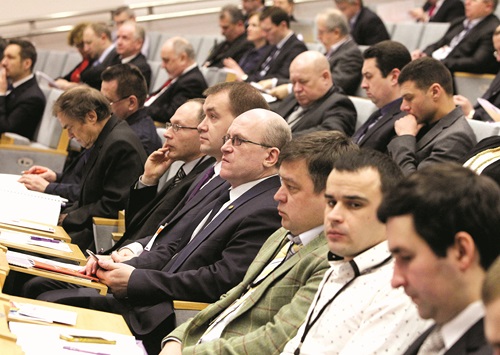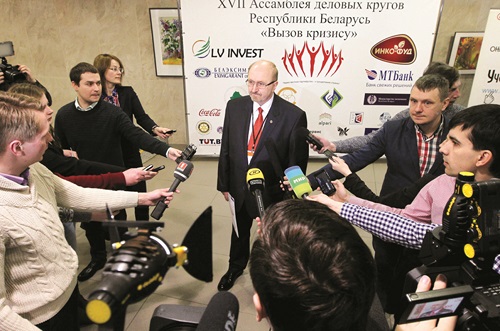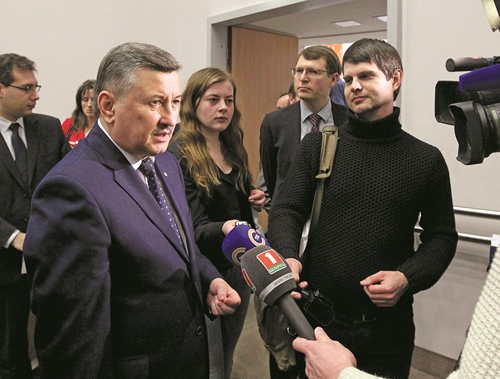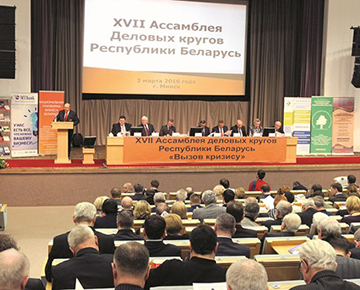Minsk hosts 17th Assembly of Business Circles of Belarus under motto of ‘crisis challenge’

Assembly of Business Circles
The national business platform was held as part of the Assembly of Business Circles, aiming to promote the country’s business climate: by encouraging partnership between entrepreneurs and the state, fair competition, production development and the creation of new jobs, anti-monopoly policy and a strategy for joining foreign markets.
Businesses and authorities share a common view on major economic challenges and ways of overcoming obstacles, realising that prices need to be reduced and that our foreign market presence needs to be amped up.
Belarus’ Foreign Ministry has proposed that the business community establish a working group on export development, notes Foreign Minister Vladimir Makei. Speaking to the Assembly, he commented that the Ministry supports contact with Belarusian business circles and plans to develop these further. He announced, “We’re open to dialogue with businesses. Moreover, we’ve agreed with the Republican Confederation of Entrepreneurship that we should conclude a framework agreement on co-operation and establish a working group to interact on exports, and other topical issues.”

Participants of the Assembly
Mr. Makei has asked representatives of small and medium-sized businesses to send in suggestions regarding a programme of joint action (before an agreement with the Confederation is signed). The Minister notes that over 22,000 legal entities operate in Belarus but only around nine take part in export activity. He has emphasised, “Much work lies ahead, as around two-thirds of companies are yet to begin exporting. Our task is to attract them to do so.”
Vladimir Makei, the Foreign Minister:
We’ve agreed to prepare a joint programme of action with the Association of Entrepreneurs. Moreover, we’ve decided to establish a working group at the Foreign Ministry to promptly track any problematic issues in our dialogue and take necessary decisions — including in the context of raising export potential.
The 17th Assembly of Business Circles was a key event at the Week of Entrepreneurship in Belarus, gathering business leaders, founders and directors of private companies, heads and specialists of ministries and agencies, diplomats and representatives of regional and branch business associations. Looking at the 2016 Belarus National Business Platform, participants were focusing on topical issues for entrepreneurs and proposals for interaction between the state and businesses.
Vladimir Karyagin, the Chairman of the Republican Confederation of Entrepreneurship’s Presidium:
We want to understand our role in attracting investment into Belarus, and how best to develop exports. Many interesting export programmes are being planned, initiated by businesses, and Belarus-born oligarchs are ready to help (now living in Russia and in other states). We need sea access, to which end representatives of Baltic ports are proposing a corridor for Belarus towards the Baltic Sea.
The Foreign Ministry has prepared a draft law on liberalising the visa regime for business circles, aiding communication with foreign partners. Meanwhile, the Economy Ministry is proposing to introduce an obligatory 50 percent quota on private business participation on c-consultative councils.
Economy Minister Vladimir Zinovsky told the Assembly, “This is important for further progress. I’m convinced that our proposal will enjoy support.” He believes that the establishment of public-consultative councils will see success as part of the directive ‘On the Development of Entrepreneurial Initiative and Promotion of Business Activity in the Republic of Belarus’, adopted in 2010. Since then, 31 councils have been established and, from 2013-2015, they held over 250 sessions, in addition to over 180 meetings of other expert groups. “The President is now working with representatives of the business community to keep activity current and relevant,” Mr. Zinovsky explains.

Questions to Vladimir Karyagin
Vladimir Zinovsky, the Economy Minister:
As far as dialogue is concerned, it seems to me that there’s been plenty of dialogue.
We’ve established shared views by the state and businesses regarding entrepreneurial development. We want to achieve this via anti-monopoly practice, principles of competition and fair privatisation. Trade Minister Vladimir Koltovich has noted that private companies account for the lion’s share of trade, which tells us a great deal.

Economy Minister Vladimir Zinovsky
Vladimir Koltovich, the Trade Minister:
I’ve today leant that Oginski’s ‘Polonaise’ is the anthem of the Minsk Union of Entrepreneurs. I hope that this composition, ‘Farewell to Homeland’, will resound more optimistically in the future, inspiring us to work in our native country and for its benefit.
By Vladimir Khromov
Photo BELTA
View from Minsk
A win-win ‘loan game’

Yuri Tsarik, Center for Strategic and Foreign Policy Studies
Following lifting of sanctions, as approved by the EU Council on February 15th, Minsk hosted several high level EU delegations
The joint visit by the Deputy Director-General of the EC Directorate-General for Neighbourhood and Enlargement Negotiations, Katarina Mathernova, and European Investment Bank Vice-President László Baranyay was marked by a number of far-reaching declarations regarding opportunities for Belarus-EU economic co-operation.
This was followed by a visit from the EU Special Representative for Human Rights, Stavros Lambrinidis, including a meeting with the President of Belarus, Alexander Lukashenko. During talks on the delicate matter of human rights, the Belarusian leader hailed improving Belarus-EU relations and welcomed the opportunity to ‘establish normal trade, economic and investment co-operation’. He underlined the Belarusian approach to human rights, saying that economic and humanitarian issues are inseparable. Unlike many times before, this was regarded with favour by the EU Special Representative.
Between those major meetings, other developments came under scrutiny, such as statements and other interventions from the European Parliament President Martin Schultz, from the Head of the EU Delegation to Belarus Andrea Wiktorin, from the German Ambassador to Belarus Peter Dettmar, from the Konrad Adenauer Stiftung President Hans-Gert Pöttering, as well as from a number of Belarusian officials representing executive and legislative powers.
Despite the declared irrelevance of geopolitical considerations regarding the EU’s decision to lift sanctions imposed on Belarus, it is well understood (both in Belarus and the EU, as well as in the USA) that this shift in policy is, to some extent, a response to the Belarusian ‘non-alignment’ position regarding the Ukraine crisis. This position has helped prevent the further spread of instability in the region, while pulling Russia into Minsk-based negotiations.
Belarusian authorities underline that the country has not changed its strategic priorities in the region. Belarus remains a trustworthy member of both the Eurasian Economic Union and bilateral Union with Russia. It has no desire to join the EU. And its leadership remains realistic, if not sceptical, regarding the prospects for and the potential effect of economic reform during this time of major regional economic crisis.
For that reason, Mr. Lukashenko and his Government spent considerable time and effort in February 2016 negotiating with Moscow on economic and financial support measures for Belarus and joint steps to counter economic crisis.
The irony is that Russia’s reported consent to provide a stabilisation loan to Belarus ($1.1bn in 2016 and $1bn in 2017) might contribute to further development of Belarus-EU ties rather than hamper them. The stringent terms of the loan include price liberalisation, as well as raising housing and public utilities fees, limiting salary growth and cutting direct lending to state owned enterprises. Many of those terms correspond to the conditions laid down by the International Monetary Fund, which is also involved in negotiations to provide financial support to the Belarusian economy. In fact, many experts state that the Eurasian Fund for Stabilisation and Development (EFSD) demands more stringent and unpopular measures than the IMF.
The amount and financial terms of the loan provided by the EFSD cover just a part of Belarus’ need for financial resources. To be exact, the EFSD loan is sufficient only for restructuring Belarusian sovereign debt to Russia. Minsk still needs the IMF loan (alongside other financial and technical aid from the EU, EIB, EBRD and other institutions) to keep its economy running and raise its effectiveness.
Thus Russia-backed loan undoubtedly broadens the Belarusian leadership’s margin for manoeuvre. But it also creates grounds for greater receptiveness to EU proposals across all spheres, which is good for Belarus-EU relations.











